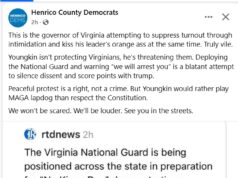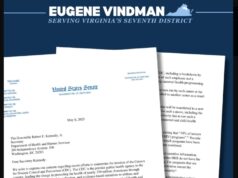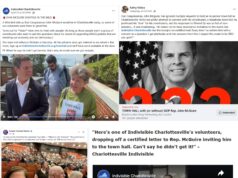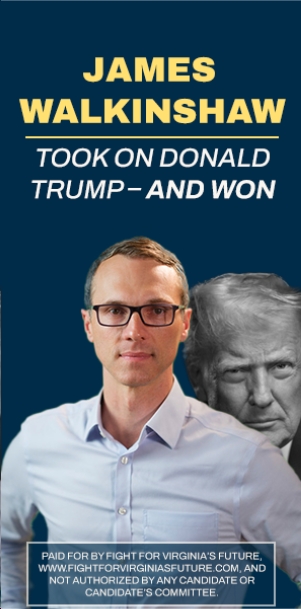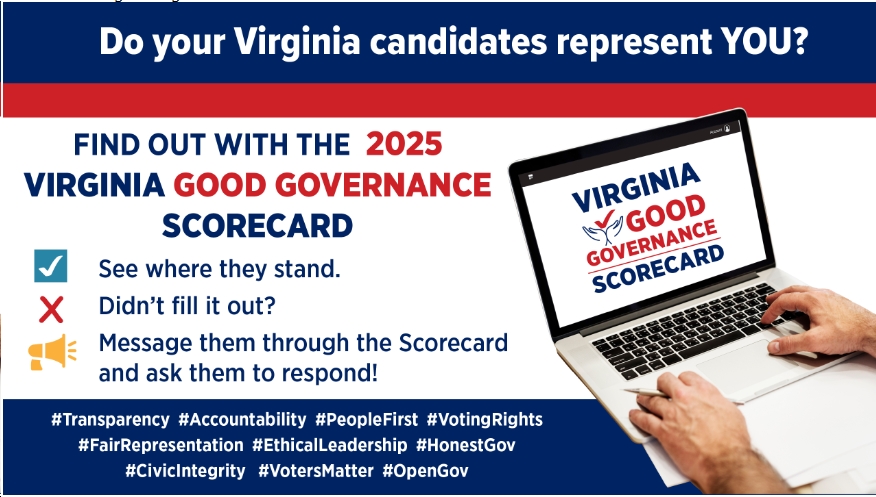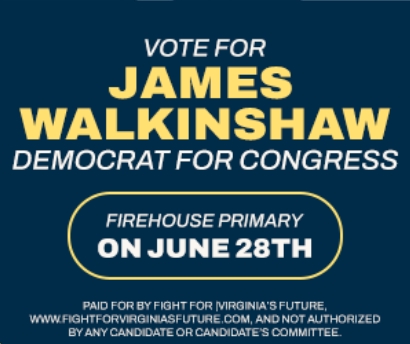by Robbin Warner, Postcards4va
Postcard writing has gained momentum within the resistance movement both to contact elected officials and to connect with voters. Whereas modern day campaign mailers are slick and mass produced, the hallmark of the resistance postcards is their low-tech and personal approach. Each card is a handwritten, individual note crafted by a grassroots activist, many of whom are new to activism.
Little research exists on the use of personal notes in campaigns and even less on the impact on the writers. Social psychology research has found mental health benefits from writing, especially in dealing with traumatic events (Pennebaker & Chung 2007). Research also shows that sharing positive social experiences with others promotes feelings of meaning and purpose in life (Major, Lundberg & Frederickson, 2017), which may have direct implications for sustaining volunteer engagement in political activities.
With these results in mind, Postcards4VA (a grassroots Virginia group) and CitizenBe (behavioral science research firm) surveyed 619 volunteers who had committed to participating in Postcard4VA’s 100 Postcards Challenge for the 2017 Virginia election to study the impact of writing postcards on the civic engagement of the writers.
Participants reported on:
- whether they wrote postcards alone or with others (such as at postcard writing parties)
- the positive emotions they felt during postcard writing
- their perceptions of how impactful their efforts would be in having an impact on the political system
- level of self-identification with political participation
- their intentions to engage in future political actions
The 100 Postcards Challenge resulted in over 137,469 postcards being mailed in support of 28 Virginia House of Delegate candidates involving some 1600 registered volunteers. The true number of volunteers is likely much larger because many engaged friends and family who were not officially registered with the Challenge to help write their 100 cards.
The study found that the social and emotional elements of writing postcards can increase civic engagement in terms of emotional outlook, scope of involvement, and likelihood of continued participation.
Key Study Findings:
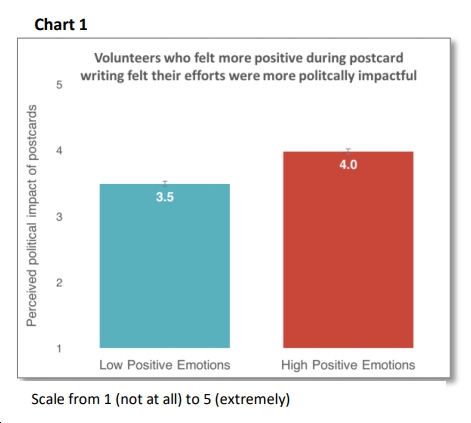 Volunteers who felt more positively about their postcard writing experience reported greater willingness to take future political action. Self-reported positive emotions during postcard writing was significantly associated with lower levels of burnout, greater perceived impact on the political system, and greater intention to take future political action. (Chart 1)
Volunteers who felt more positively about their postcard writing experience reported greater willingness to take future political action. Self-reported positive emotions during postcard writing was significantly associated with lower levels of burnout, greater perceived impact on the political system, and greater intention to take future political action. (Chart 1)
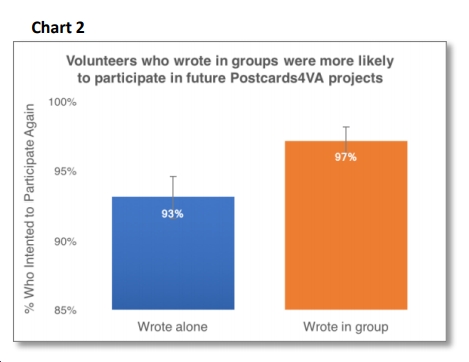 Volunteers who teamed up with others to write postcards reported greater willingness to take future political action. People who wrote postcards in social settings (such as postcard parties) reported less burnout, greater belief that their actions would have an impact on the political system, and greater intentions to take political action in the future. (Chart 2)
Volunteers who teamed up with others to write postcards reported greater willingness to take future political action. People who wrote postcards in social settings (such as postcard parties) reported less burnout, greater belief that their actions would have an impact on the political system, and greater intentions to take political action in the future. (Chart 2)
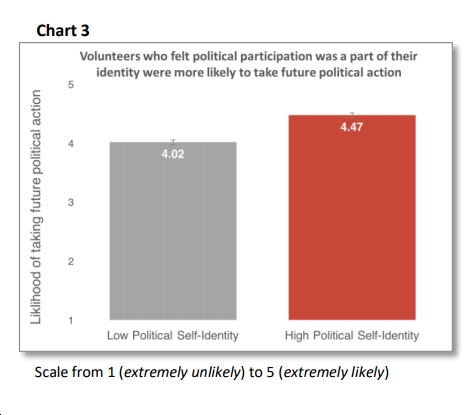 Future political engagement is more likely when political action is more closely with self-identity. Reported self-identification with political participation was significantly associated with greater enjoyment from postcard writing, less burnout, greater social closeness with other volunteers, greater perceived impact of their actions on the political system, and greater intention to take future political action. (Chart 3)
Future political engagement is more likely when political action is more closely with self-identity. Reported self-identification with political participation was significantly associated with greater enjoyment from postcard writing, less burnout, greater social closeness with other volunteers, greater perceived impact of their actions on the political system, and greater intention to take future political action. (Chart 3)
Winning may change memories of past volunteer experiences and make people more likely to participate again in the future. In our study, some participants completed the survey before the election and some completed the survey after the election (and thus were aware of sweeping Democratic victories). We found that participants who completed the survey after the election (compared to those who completed it before the election) reported greater levels of positive emotions during postcard writing, greater perceived impact on the political system, less burnout, and greater social closeness to other volunteers. We speculate that knowledge of Democratic victories may have enhanced how people remembered their volunteer experiences.
- Postcard writers also engaged in other political activities. (Charts 4 and 5)
- Postcard writers believed their postcards would have an impact.
- Almost all postcard writers were 35 and older with 48% being over 55. This profile matches those motivated for political action after the 2016 election, the resistance.
- Postcard writers were college educated, many with advanced degrees.
- Over 70% of postcard writers participated in the Women’s March.
- All postcard writers of voting age were registered to vote.
- Participants expressed a strong interest in writing postcards for future campaigns.
References Cited
Major, B. C., Lundberg, K.B., & Fredrickson, B. L. (2017). Health and wellbeing correlates of perceived positivity resonance: Evidence from trait and episode-level assessments. Personality and Social Psychology Bulletin. (Revision invited)
Pennebaker JW, Chung CK. 2007. Expressive writing, emotional upheavals, and health. In Handbook of Health Psychology, ed. H Friedman, R Silver, pp. 263–84. New York: Oxford University Press.
______
CitizenBe (citizenbe.org) is a non-profit group of social and behavioral scientists that works to create and sustain impactful political participation. We help groups become more effective through evidence-based research and testing.
Postcards4VA (postcards4va.com) is a grassroots postcard initiative dedicating to flipping Virginia’s elected officials blue.
For more information, contact Robbin Warner, Postcards4va | robbin@postcards4va.com or Brett Major, CitizenBe | brett@citizenbe.org



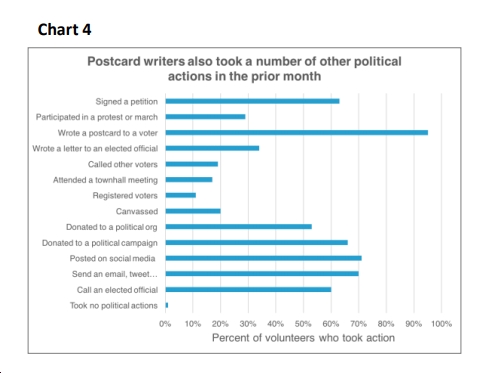
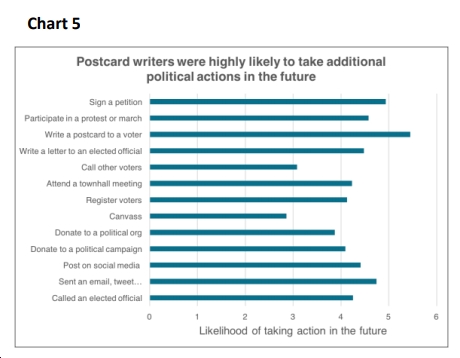
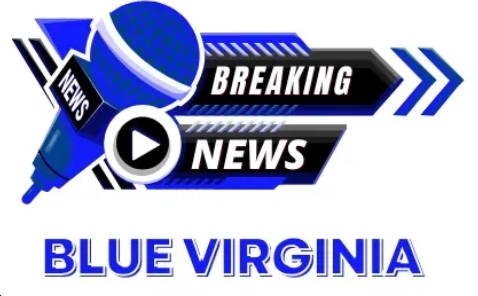 Sign up for the Blue Virginia breaking news newsletter
Sign up for the Blue Virginia breaking news newsletter